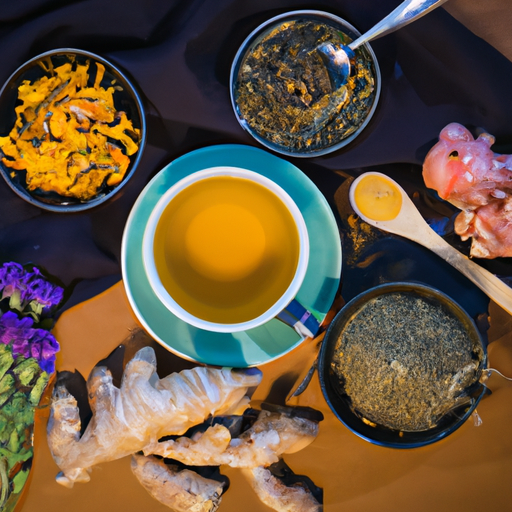As a person who has recently had surgery, I am interested in knowing which foods and beverages can help with my recovery. Turmeric tea has piqued my interest due to its health benefits and anti-inflammatory properties. Nonetheless, I understand that certain foods and drinks may hinder the healing process and lead to complications.
So, the question remains: can I drink turmeric tea after surgery?
In this article, I will explore the benefits and risks of consuming turmeric tea after surgery, as well as alternative ways to incorporate turmeric into your diet. I will also discuss the importance of consulting with your doctor and monitoring for any complications that may arise. By the end of this article, you will have a better understanding of whether turmeric tea is a good option for you during your post-surgery recovery.
Key Takeaways
- Turmeric tea has anti-inflammatory properties that can aid in post-surgery recovery, but it may have blood-thinning effects that could interfere with the healing process or interact with certain medications.
- It is recommended to consult with a doctor before incorporating turmeric tea into a post-surgery routine and to start with a small amount and gradually increase intake over time.
- Adequate rest and monitoring for signs of bleeding are crucial for successful post-surgery recovery, as well as gradually reintroducing post-surgery nutrition and staying hydrated.
- Communication with a doctor and following post-surgery care instructions are key in post-surgery care, and prioritizing sleep and taking steps to improve sleep environment can better manage pain levels and promote healing during recovery.
The Benefits of Turmeric Tea
You’ll love the benefits of turmeric tea – it’s been shown to have anti-inflammatory properties that can aid in post-surgery recovery. In fact, turmeric has been used for centuries in Ayurvedic medicine to treat a variety of ailments, including inflammation, digestive issues, and skin conditions.
Turmeric tea recipes typically involve steeping turmeric root or powder in hot water, along with other spices such as ginger and cinnamon, to create a comforting and healing beverage.
Aside from its anti-inflammatory properties, turmeric tea also contains powerful antioxidants that can help protect against cellular damage and promote overall health. Some studies have even suggested that turmeric may have a role in preventing chronic diseases such as cancer and Alzheimer’s.
So if you’re looking for a natural way to support your body’s healing process after surgery, turmeric tea may be just the thing you need. That being said, it’s important to understand the risks of turmeric tea after surgery.
While turmeric is generally safe for most people, it can have blood-thinning effects that could interfere with the healing process or interact with certain medications. It’s always a good idea to talk to your doctor before incorporating any new supplements or remedies into your post-surgery routine.
Understanding the Risks of Turmeric Tea After Surgery
It’s important to be aware of the potential dangers of consuming turmeric tea after a surgical procedure.
Although turmeric tea has been shown to have numerous health benefits, it can also interfere with the healing process.
Turmeric contains curcumin, which has been found to have blood-thinning properties. This can increase the risk of bleeding during and after surgery.
Additionally, turmeric can interact with certain medications, such as blood thinners, painkillers, and antidepressants, which can further compromise the healing process.
Therefore, if you’re considering drinking turmeric tea after surgery, it’s important to consult with your doctor beforehand.
They can advise you on whether it’s safe to consume turmeric tea and if it will have any negative effects on your recovery.
Your doctor may also recommend alternative beverages or supplements that are better suited for your post-surgery needs.
By taking the necessary precautions and consulting with your doctor, you can ensure a safe and successful recovery.
Consult with Your Doctor
Before consuming any new beverages or supplements during post-surgery recovery, it is crucial to consult with a medical professional to ensure safe and effective healing. This includes discussing any medication, alternative remedies, and potential risks associated with consuming turmeric tea. While turmeric has been known to have anti-inflammatory properties, it is important to note that it may interact with certain medications and can potentially increase the risk of bleeding. Therefore, it is important to have a thorough discussion with your doctor before adding turmeric tea to your post-surgery recovery routine.
To help guide the conversation with your doctor, consider using the following table as a reference:
| Topic | Questions to Ask |
|---|---|
| Medications | Will turmeric tea interact with any of my current medications? |
| Alternative Remedies | Are there any other natural remedies that would be more beneficial for my recovery? |
| Potential Risks | What are the potential risks associated with consuming turmeric tea during post-surgery recovery? |
| Timing | When is the best time to consume turmeric tea during my recovery? |
By discussing these important factors with your doctor, you can make an informed decision about whether or not turmeric tea is a safe and effective addition to your post-surgery recovery regimen. In the next section, we will explore the optimal timing of turmeric tea consumption for maximum benefits.
Timing of Turmeric Tea Consumption
Once you’ve been cleared by your doctor, figuring out the optimal timing and frequency of consuming turmeric tea during your post-surgery recovery is crucial. It’s important to note that excessive consumption of turmeric may cause stomach discomfort or interact with certain medications, so it’s best to start with a small amount and gradually increase your intake over time.
Generally, it’s recommended to consume turmeric tea after meals to aid in digestion and absorption. Some people prefer to drink it in the morning or before bed to help with inflammation and promote relaxation. It’s also important to listen to your body and adjust your consumption based on how you feel. Consulting with a nutritionist or healthcare provider can also provide guidance on the best way to incorporate turmeric into your diet.
Moving on to the next section, there are alternative ways to consume turmeric that can be just as effective as drinking tea.
Alternative Ways to Consume Turmeric
To add some spice to your meals, try sprinkling turmeric on roasted vegetables or mixing it into your favorite curry recipe. Turmeric is a versatile spice that can be consumed in a variety of ways. Here are some alternative turmeric consumption methods to try:
-
Golden milk: This warming and comforting drink is made by simmering turmeric and other spices in milk. It’s a great way to wind down before bed or to start your day off on the right foot.
-
Turmeric supplements: If you’re not a fan of the taste of turmeric, supplements may be a good option for you. They come in pill or powder form and can be easily added to smoothies or drinks.
-
Turmeric shots: These concentrated shots are a quick and easy way to get a boost of turmeric. They’re often mixed with other beneficial ingredients like ginger or lemon.
-
Turmeric paste: This paste can be used as a base for curries or added to soups and stews. It’s made by cooking turmeric with water and other spices until it forms a thick paste.
Exploring these turmeric tea alternatives can add some variety to your post-surgery diet. However, it’s important to consult with your healthcare provider before making any significant changes to your diet or supplementation routine.
Other Foods to Include in Your Post-Surgery Diet
You’ll want to incorporate nutrient-rich foods like leafy greens, lean protein, and whole grains into your post-surgery diet to promote healing and recovery. Protein sources such as chicken, fish, beans, and tofu are essential for rebuilding and repairing tissues.
Vitamin-rich foods like sweet potatoes, spinach, and berries can boost your immune system and help fight off infection. It’s important to note that hydration and rest are also crucial components of the post-surgery recovery process.
Drinking plenty of water and getting adequate rest will help your body heal and promote overall wellness. With a balanced diet and proper self-care, you’ll be on your way to a speedy recovery in no time.
Hydration and Rest
As someone who’s undergone surgery, I know how important it is to stay hydrated and get adequate rest during the recovery process.
Hydration is crucial for flushing out toxins from the body and promoting healing, so it’s essential to drink plenty of water and other fluids.
Getting enough rest is equally important as it gives your body the time it needs to repair and regenerate.
Importance of Staying Hydrated
Staying hydrated is key after surgery, so it’s important to make sure you’re drinking enough fluids like water, herbal teas, and even electrolyte drinks. Drinking enough water is essential for the recovery process, as it helps to flush out toxins and prevent dehydration. In addition, it promotes healthy circulation and can help to reduce inflammation in the body.
Importance of electrolytes cannot be underestimated either, as they help to regulate fluid balance and maintain healthy nerve and muscle function. Electrolyte drinks can be particularly helpful in restoring these essential nutrients to the body after surgery. Recovery drinks can also provide a good source of protein and other nutrients that are important for rebuilding tissues and supporting the healing process.
So, remember to stay hydrated with plenty of fluids and nourish your body with healthy recovery drinks post-surgery.
Ensuring that you get adequate rest is also crucial for a successful recovery.
Getting Adequate Rest
As someone who’s undergone surgery before, I know how important it is to get adequate rest during recovery. Surgery can take a toll on the body, both physically and mentally, and getting enough sleep is crucial for the healing process. Not only does sleep help your body repair itself, but it also helps manage pain levels and reduce stress.
It’s understandable that after surgery, it may be difficult to get comfortable and fall asleep. However, there are a few things you can do to improve your chances of getting a good night’s rest. Firstly, try to establish a consistent sleep schedule and stick to it as much as possible.
Secondly, create a comfortable sleep environment by adjusting the temperature, using supportive pillows, and minimizing noise and light. By prioritizing sleep and taking steps to improve your sleep environment, you can better manage pain levels and promote healing during your recovery.
With the importance of sleep and pain management in mind, it’s important to also monitor for any complications that may arise during your recovery. By staying vigilant and seeking medical attention if needed, you can ensure a safe and successful recovery process.
Monitoring for Complications
As I’m recovering from surgery, it’s important to monitor for any signs of bleeding. These can include increased pain, swelling, or redness at the surgical site. It’s also important to watch out for unusual bruising or bleeding from other areas of the body.
If I notice any of these symptoms or have any concerns about my recovery, it’s important to report them to my doctor immediately. This will help prevent any potential complications.
Signs of Bleeding
If you notice any red flags, like your wound not stopping bleeding or excessive bruising, you should definitely contact your doctor before sipping on that turmeric tea. Don’t let the cat out of the bag by ignoring potential signs of bleeding.
Preventing complications and managing postoperative bleeding are critical to a successful recovery. While turmeric tea has been shown to have anti-inflammatory properties, it’s important to prioritize your health and keep a close eye on any symptoms that may arise.
To prevent bleeding after surgery, make sure to follow your doctor’s instructions for wound care and avoid any activities that may put stress on the affected area. Additionally, maintaining a healthy diet and staying hydrated can help support proper healing and prevent complications.
Remember, if you experience any unusual symptoms or have concerns about your recovery, it’s essential to report them to your doctor for prompt evaluation and treatment.
Reporting Any Concerns to Your Doctor
After learning about the signs of bleeding after surgery, it’s important to remember that communication with your doctor is key in post-surgery care. If you have any concerns or questions about your recovery, it’s crucial to report them to your doctor right away. This can include any unusual symptoms or side effects that you may be experiencing, such as increased pain or swelling.
By keeping an open line of communication with your doctor, you can ensure that any potential complications are addressed promptly and effectively. In addition to reporting any concerns to your doctor, it’s also important to follow any post-surgery care instructions that you have been given. This may include taking medication as prescribed, avoiding certain activities, or making changes to your diet.
Speaking of which, one common question that people have after surgery is whether or not they can drink turmeric tea. While turmeric has many health benefits, it’s always best to consult with your doctor before making any significant changes to your diet.
Transitioning into the subsequent section about ‘gradual return to normal diet’, it’s important to remember that post-surgery care is a gradual process. As your body begins to heal, you may be able to gradually reintroduce certain foods and drinks into your diet.
Gradual Return to Normal Diet
You can start to reintroduce your normal diet gradually, including options like turmeric tea after surgery. Gradual reintroduction of post-surgery nutrition is important to avoid any complications and to ensure a smooth recovery process.
Here are some tips to help you reintroduce your normal diet safely and efficiently:
- Start with small portions of easily digestible foods such as soups, smoothies, and pureed fruits and vegetables.
- Avoid spicy, fatty, and greasy foods as they can cause nausea and discomfort.
- Make sure to stay hydrated by drinking plenty of water and other fluids such as coconut water and herbal teas.
- Incorporate protein-rich foods such as lean meats, fish, eggs, and legumes to help with tissue repair and healing.
- Consult with your doctor or a registered dietitian to create a personalized nutrition plan that suits your specific needs and diet restrictions.
By following these tips, you can gradually reintroduce your normal diet and safely enjoy options like turmeric tea after surgery. Remember to listen to your body and make changes to your diet as needed to ensure a smooth and successful recovery.
Frequently Asked Questions
What are the potential side effects of consuming turmeric tea after surgery?
I’ve learned that turmeric tea benefits include reducing inflammation and aiding digestion. However, potential side effects after surgery are not well-studied. It’s best to consult with a doctor before consuming turmeric tea. Additionally, turmeric tea recipes can vary widely.
Can I consume turmeric tea if I am taking certain medications?
I should consult with my doctor or pharmacist before consuming turmeric tea if I am taking any medications. Certain medications may interact with turmeric, and it is important to adhere to the recommended dosage.
How much turmeric tea is safe to consume after surgery?
Postoperative recovery can be enhanced by consuming turmeric tea in moderate amounts. The recommended dosage is 1-2 teaspoons of turmeric powder per day. Consult with a healthcare provider before use.
Are there any specific types of surgery where turmeric tea should be avoided?
Post-surgery precautions should be taken with turmeric tea as it can impact blood clotting. While it is generally safe, those who have had surgeries that involve bleeding should avoid it until consulting with their doctor.
Can turmeric tea affect the healing process after surgery in any way?
When it comes to the healing process after surgery, it’s important to consider the benefits and risks of consuming turmeric tea. It’s recommended to consult with a healthcare professional regarding dosage recommendations.
Conclusion
Overall, it’s important to be cautious when considering consuming turmeric tea after surgery. While there are many potential benefits to turmeric, there are also risks that need to be taken into account. It’s always best to consult with your doctor before making any significant changes to your diet or supplement routine, especially during the recovery period following surgery.
If you do decide to consume turmeric tea, timing is crucial. It’s recommended that you wait at least a week after surgery before consuming turmeric tea, and even then, start with small amounts.
Be sure to monitor yourself for any adverse reactions, and if you experience any discomfort or complications, stop consuming turmeric tea immediately and consult with your doctor.
In conclusion, while turmeric tea can offer many potential benefits, caution should be exercised when considering consuming it after surgery. It’s always best to consult with your doctor and take a gradual approach to incorporating turmeric into your diet. As the saying goes, "slow and steady wins the race,"and this is especially true when it comes to your recovery after surgery.










